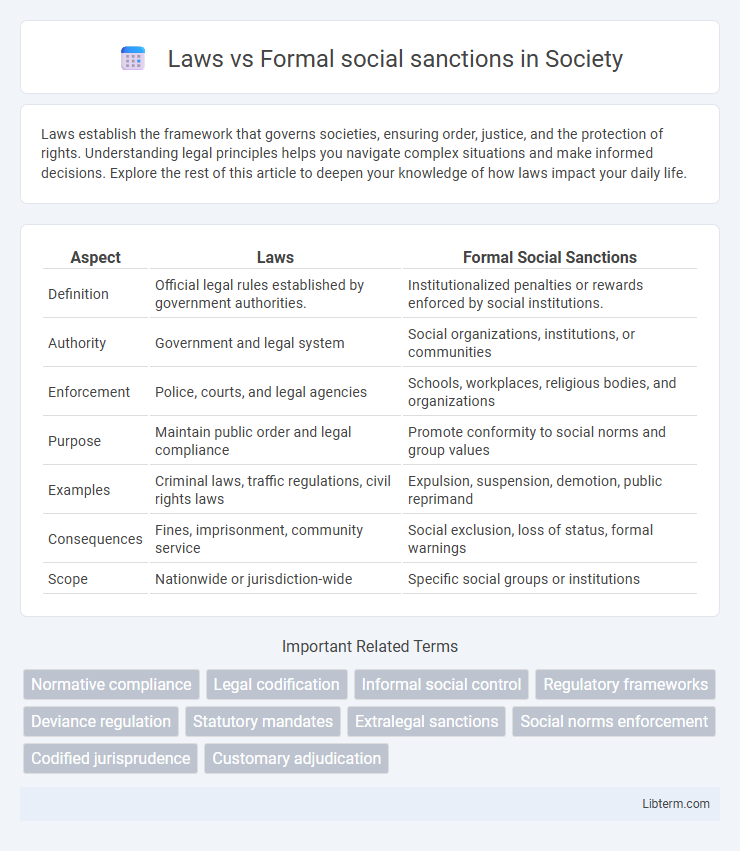Laws establish the framework that governs societies, ensuring order, justice, and the protection of rights. Understanding legal principles helps you navigate complex situations and make informed decisions. Explore the rest of this article to deepen your knowledge of how laws impact your daily life.
Table of Comparison
| Aspect | Laws | Formal Social Sanctions |
|---|---|---|
| Definition | Official legal rules established by government authorities. | Institutionalized penalties or rewards enforced by social institutions. |
| Authority | Government and legal system | Social organizations, institutions, or communities |
| Enforcement | Police, courts, and legal agencies | Schools, workplaces, religious bodies, and organizations |
| Purpose | Maintain public order and legal compliance | Promote conformity to social norms and group values |
| Examples | Criminal laws, traffic regulations, civil rights laws | Expulsion, suspension, demotion, public reprimand |
| Consequences | Fines, imprisonment, community service | Social exclusion, loss of status, formal warnings |
| Scope | Nationwide or jurisdiction-wide | Specific social groups or institutions |
Introduction to Laws and Formal Social Sanctions
Laws are codified rules established by governing authorities to regulate behavior and ensure social order, enforced through formal institutions such as courts and law enforcement agencies. Formal social sanctions involve official penalties or rewards administered by recognized bodies to promote conformity to societal norms and legal standards. Both laws and formal sanctions serve as critical mechanisms to maintain discipline and structure within a society.
Defining Laws: Characteristics and Purpose
Laws are formalized rules enacted by governmental authorities to regulate behavior and maintain social order by outlining permissible and prohibited actions. They possess characteristics such as codification, enforceability through official institutions, and legitimacy derived from a recognized legal system. The primary purpose of laws is to establish clear standards of conduct, ensure justice, and protect the rights and safety of individuals within society.
Understanding Formal Social Sanctions
Formal social sanctions are institutionalized mechanisms enforced by authorized entities such as governments or organizations to regulate behavior and maintain social order. These sanctions include penalties like fines, imprisonment, and official reprimands that are codified in laws and regulations, ensuring predictable and standardized consequences for violations. Understanding formal social sanctions involves recognizing their role in reinforcing legal norms and deterring deviant behavior through systematic enforcement.
Key Differences Between Laws and Formal Social Sanctions
Laws are codified rules established by governmental authorities with formal enforcement mechanisms, whereas formal social sanctions are organized responses by social institutions or groups to enforce conformity. Laws carry legal consequences such as fines or imprisonment, while formal social sanctions typically involve non-legal penalties like social exclusion, reprimands, or institutional disciplinary actions. The primary difference lies in the source of authority and the formality of enforcement, with laws being state-imposed and formal social sanctions arising from social or organizational norms.
Examples of Laws in Society
Laws in society regulate behavior through codified rules enforced by government institutions, such as traffic laws that mandate speed limits to ensure road safety, or criminal laws prohibiting theft and assault to protect individuals and property. Formal social sanctions arise from these laws and include penalties like fines, imprisonment, and community service, which deter violations and maintain social order. Examples such as DUI laws illustrate how formal sanctions impose consequences on unlawful conduct to reinforce societal norms and legal compliance.
Examples of Formal Social Sanctions
Formal social sanctions are official responses to behavior that violate established rules or norms, often enforced by institutions such as courts, schools, or workplaces. Examples include fines imposed by the legal system, suspension or expulsion in educational settings, and termination of employment for violating company policies. These sanctions serve to maintain order and reinforce societal standards through legally or organizationally sanctioned consequences.
Authority and Enforcement: Who Imposes Each?
Laws are imposed and enforced by governmental authorities such as legislatures, police, and judicial systems, ensuring compliance through formal legal procedures and penalties. Formal social sanctions, although also backed by authoritative institutions, often arise within organizations or institutions like schools, workplaces, or religious bodies, enforcing conformity through official disciplinary measures. Both rely on structured enforcement mechanisms, but laws possess universal jurisdiction while formal social sanctions operate within specific social groups or institutions.
Societal Impact of Laws vs Formal Sanctions
Laws establish a structured framework that governs behavior, ensuring social order and protecting individual rights through codified rules enforced by official institutions. Formal social sanctions, such as fines, imprisonment, or community service, act as immediate consequences for violations, reinforcing societal norms and deterring misconduct. The societal impact of laws lies in their ability to create predictable, consistent standards that promote justice and stability, while formal sanctions maintain compliance and reinforce the legitimacy of the legal system.
Interplay and Overlap Between Laws and Social Sanctions
Laws and formal social sanctions interact by reinforcing societal norms through codified rules and prescribed penalties, ensuring compliance within a structured legal framework. While laws provide clear, official consequences for behavior, social sanctions exert pressure via community approval or disapproval, often influencing legal outcomes and vice versa. This interplay creates overlapping mechanisms that uphold social order, where informal norms shape lawmaking and legal enforcement impacts social acceptance.
Conclusion: The Importance of Both in Social Order
Laws and formal social sanctions both play crucial roles in maintaining social order by providing clear rules and consequences for behavior. Laws, established through legal systems, ensure consistency and enforceability, while formal social sanctions, such as institutional penalties, promote adherence to social norms and values. Together, they create a balanced framework that upholds societal stability and encourages responsible conduct.
Laws Infographic

 libterm.com
libterm.com